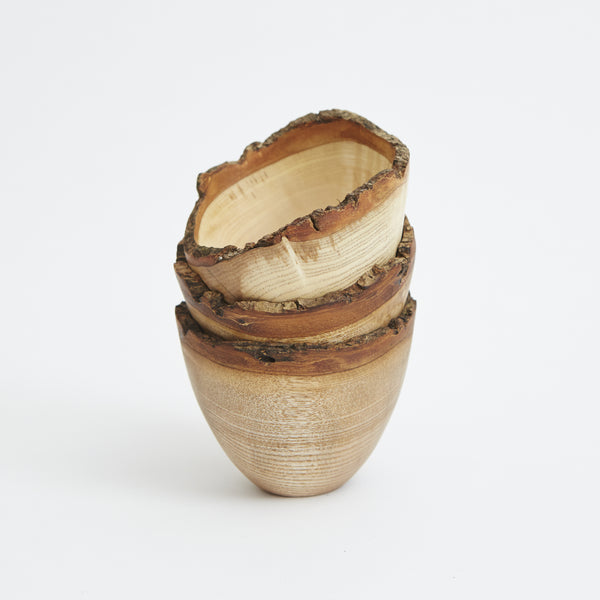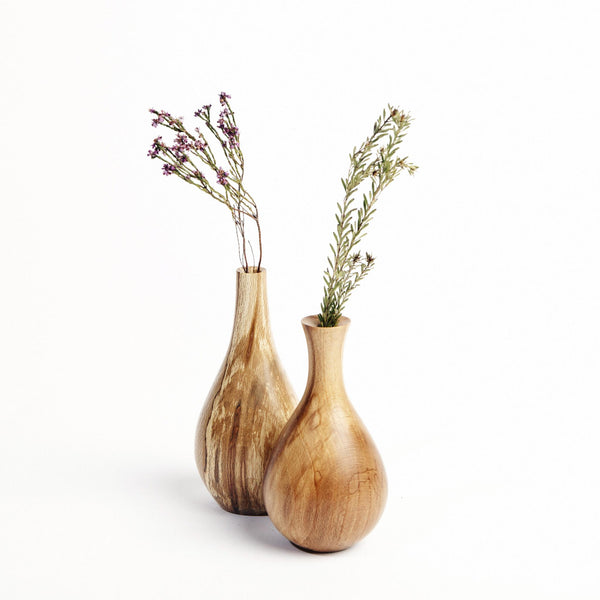
Roy Humphreys - Hand turned bowls
Posted by Laura Caffrey in: Irish design shop, Maker Story, sustainable design, Wood Turning

What do you make?
I make a variety of objects e.g.
- Bowls
- Lamps
- Nest of tables
- Pepper & Salt Mills and Shakers
- Key Rings
- Tea Lights
- Ornaments (Mushrooms Apples, Pears)
Could you tell us a little bit about your studio? Favourite thing about the space and how do you get into the mindset of making?
When I set up my studio I thought long and hard about the products I was going to produce and with that in mind, I positioned my machinery to create an efficient workflow.
What is your favourite tool and why?
I have many different tools suitable for creating the different pieces; my favourite would be a bowl gouge. It is a strong stable tool made of quality steel and I find it a pleasure to use.

Can you describe the making process and inspiration behind your raw edge bowls?
Raw edge bowls can be quite challenging to make, as the bark can be quite brittle on the seasoned timber. During the shaping process, it is necessary to add stability to the bark in order to give a satisfactory finish. Inspiration comes from the texture of a piece of wood and my vision of what I can create from it taking into consideration the size and shape of a particular piece of raw material.
What led you to choosing this craft as a profession? What do you love most about it?
I am fortunate to be part of a family who have been working in the timber business for several generations and this has led me to appreciate and value the importance of caring for our many home-grown timbers. I am the only one of my family involved in craft work. I love to create different shapes and produce a quality finish which is pleasing to see and touch. I aim to give individuality to the home décor.
We have a small selection of Roys's hand turned bowls available through our online shop and our Drury Street shop.

Matt Jones - Woodturner
Posted by Laura Caffrey in: Makers, sligo, Wood turning

We came across Matt Jone's work a few years back and were immediately drawn to the objects he was making, the incredible craftsmanship, and obvious love and respect for the material.
He began making the twig pots we sell out of off-cuts from larger pieces, but they proved so popular he had to start ordering timber in specifically for them. Recently he began making salt and pepper grinders with ceramic mechanisms, and is always producing incredible large bowls and vessels, often recording the progress of a piece on facebook
He now makes beautiful wall hooks exclusively available at the Irish Design Shop, click here to shop or just have a look.
We caught up with Matt on our visit to Sligo last year and asked him a few questions......
If you could tell me a little about your journey from growing up in Wales to ending up in rural Sligo turning wood?
I grew up in Milford Haven in Pembrokeshire, which is a coastal region in South West Wales. All my early memories are associated with the beach and the sea. By my teens I was certain of a career as an artist and drew constantly. I studied Painting at Chelsea and after I graduated I combined work with my art practice and playing music. Eventually I started earning money as a musician and it became impossible to make art and I wasn't enjoying it by that stage anyway. The London contemporary art scene robbed me of the simple pleasure of making things. I met Imelda in college (she was PA to the Dean) and our first child arrived before I graduated! Imelda grew up in Sligo although she was born in Dublin. By 2000 we had bought a house in Carmarthen in Wales. I was travelling a lot but was also spending long periods at home.

I wanted to get back into making and I had a feeling that craft would be a better fit for me that fine art. I think there's less bullshit. You cant convince someone that your a good craftsperson, the work speaks for itself. I attended an evening class in woodturning after borrowing the Tony Boase book on woodturning from the library. The book featured the best bowl turners from Europe and included Liam Flynn, David Comerford and Ciaran Forbes all Irish Masters. The band I was playing in imploded in 2004 and Imelda and I were ready for another change. Imeldas mother gifted an old ruin to us which I renovated. We moved in in 2008. I built my workshop soon after and started turning again.
Wales also has a very strong craft heritage, are there any Welsh craft workers you admire?
Theres a turner in Wales called Paul Clare whom I admire and Louise Hibbert is probably the best known Welsh turner. I absolutely love the work of Anthony Bryant a woodturner from Cornwall ( a celtic nation too) I'm going to visit him in April to pick his brains.
We have found some people have a negative view of the word "craft" and would rather use terms like "applied arts" - your thoughts?
I don't see any negative associations with the word craft. Some people get very perplexed about the label that is applied to them, I don't understand why.
Do you feel that your musical background influences your work in any way?
Music still pays an important part in my life. There are similarities. Both rely on very sensitive hand eye coordination, rhythm and a sort of detachment of the mind which is very peaceful.

